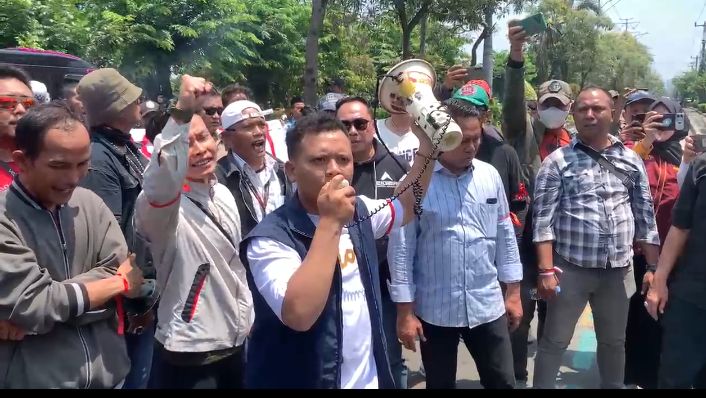“We want the government in Bekasi City to be free from corrupt actors. We hope the rising poverty in Bekasi City can be eradicated,” said a speaker during the oration.
The speaker also highlighted the unemployment problem in Bekasi City. It was hoped that the Bekasi City Government would open up as many job opportunities as possible.
“Open up job opportunities on the largest scale. The lack of employment has a domino effect of increasing crime rates, for which the City Government and DPRD must agree to create jobs,” they said.
Following are the eight demands of the DPR-B:
1. Dismiss the National Police Chief and the Bekasi City Police Chief and stop the criminalization of activists and journalists.
2. Evaluate the performance of the Red and White Cabinet.
3. Ratify the Corrupt Asset Seizure Bill.
4. Stop the eviction of people’s land and provide fair solutions.
5. Realize free education and healthcare as well as a decent standard of living in Bekasi.
6. Thoroughly investigate corruption cases in Bekasi.
7. Create a friendly and safe environment for women and children.
8. Abolish taxes considered oppressive to the people.
Bekasi City Regional Legislative Council (DPRD) building
The Bekasi City Regional Legislative Council (DPRD) building is the seat of local government for the Indonesian city of Bekasi, where elected representatives convene to debate and enact regional regulations. While its specific architectural history is modern, the institution it houses was established as part of Indonesia’s decentralization reforms following the fall of the New Order regime, granting greater political autonomy to regions.
Bekasi City Government
The Bekasi City Government administers Bekasi, a major industrial and residential hub in West Java, Indonesia. While the modern city government was established in 1997 when Bekasi was separated from the Bekasi Regency, the area itself has a long history, with archaeological evidence suggesting it was part of the 4th-century Tarumanagara Kingdom.
National Police Chief
“National Police Chief” is not a specific place or cultural site, but rather a high-ranking official position within a country’s police force. The history of such a role is tied to the development of modern, centralized law enforcement agencies, which began to form in many nations during the 19th century. The responsibilities and authority of a National Police Chief vary by country but generally involve overseeing national law enforcement operations and policy.
Bekasi City Police Chief
The Bekasi City Police Chief is the head of the municipal police force (Polresta) for Bekasi City, Indonesia. This position is responsible for maintaining security and order within the city, a major industrial and residential center on the eastern outskirts of Jakarta. The office itself is a modern institution, reflecting the city’s rapid development and growth throughout the late 20th and 21st centuries.
Red and White Cabinet
The Red and White Cabinet is a historic piece of furniture from the 18th century, renowned for its distinctive two-tone lacquer finish. It was created in Japan during the Edo period, exemplifying the exceptional craftsmanship and artistic design of that era.
Corrupt Asset Seizure Bill
The “Corrupt Asset Seizure Bill” is not a physical place or cultural site, but rather proposed legislation. It is a type of law designed to empower governments to confiscate and recover assets, such as property and funds, that have been acquired through corrupt practices. The history of such bills stems from a global effort to combat corruption and illicit financial flows by strengthening legal frameworks.






